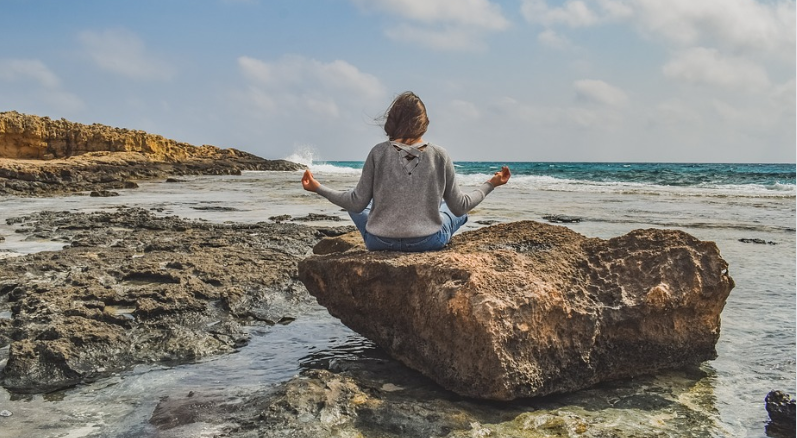Why Meditation Is Important In Our Life?
Discover why meditation is important in our lives and why it is beneficial.

Selfpause Affirmation App
Download the app to get 1,000’s of affirmation meditations and everything you need to write, record and listen to your own.
If you are experiencing stressful situations, then meditation is a great way to cope with them. It calms your nervous system and strengthens your inner knowing. It can also help you deal with difficult people. Here are some reasons why meditation is so beneficial for our life. Keeping a consistent meditation routine is crucial for the best results.
Meditation helps you deal with difficult people

If you have trouble coping with difficult people, meditation may be the answer. It rewires the brain, stimulating parts that help soothe the nervous system. Practiced daily, meditation helps you approach social situations with a calm detachment. You will learn to pause before you react, which is essential for coping with difficult people. Beginners should start with five minutes a day, working up to a 20-minute practice.
To begin, try to step away from the difficult person. This doesn’t mean that you should become passive, but that you should avoid engaging in high-octane discussion or politics. Make excuses to take some time off, if needed. Being away will help you see things from a fresh perspective.
Compassion is another important trait of a strong soul. When we are compassionate, we see people’s suffering as an opportunity for peace, love, and healing. Compassion helps us see ourselves in others, reminding us that we have also gone through the same feelings at one point in our lives. We have experienced joy, sadness, and illness. And one day, we will grow old and die.
Practicing meditation will help you deal with difficult people. Even if you disagree with them, you can still find peace, understanding, and tolerance. It teaches you to accept and deal with the situation as it is. During difficult times, you may be tempted to walk away from a difficult person, but this should not be your only option. Most of the time, challenging people can help you learn more about yourself and the world around you.
Meditation will calm your mind and your body. This is the most important part of the meditation process. You should practice meditation when you are not stressed out or overwhelmed. The key is to practice it daily and for at least five minutes every day. This will help you deal with difficult people and keep your sanity.
It calms your nervous system

Meditation is a technique that can calm your nervous system. Practices can include sense awareness, body scanning, and breath practice. Each breath has four parts, each of which contains a space of stillness. Students can practice carrying their attention through these spaces, particularly the pauses, to enhance the pleasure of the meditation.
By calming the nervous system, meditation can improve your mental concentration and focus. It brings you into the present moment, where optimal experiences can occur. It can also help you relax and sleep better. It can also help you keep your goals in perspective and stay connected to them. Meditation is also great for improving your immune system.
Researchers have found that meditation can have positive effects on cardiorespiratory health, which can help with medical conditions. Meditation alters autonomic function by decreasing the sympathetic tone and increasing the parasympathetic component. This improved balance is believed to be the reason for a nonsignificant change in resting heart rate and blood pressure.
The parasympathetic nervous system works by slowing down the body’s nervous system. This type of nervous system functions primarily through the vagus nerve, which sends impulses from the brain to the body. It helps lower the risk of cardiovascular disease, improves digestive metabolism, and reduces migraines. When this nervous system is healthy, people enjoy better health and longer life.
Meditation can help you control your stress and anxiety by calming the nervous system. It also increases your concentration and focus. It is also helpful for personal development. By practicing mindfulness meditation, you can improve your mood and increase your ability to focus. It can also decrease your pain and reduce emotional reactivity.
It strengthens your inner knowing

Meditation helps you develop a more open and nonjudgmental mind. It also enhances your intuition and inner knowing, allowing you to make better decisions. It deepens your connection to yourself, allowing you to be more aware of what your body needs. Meditation can help you cope with anxiety, stress, and phobias.
During meditation, you focus on your breath. This physical sensation is always with you and can serve as an anchor for the present moment. If your attention wanders to thoughts, emotions, or sounds, simply come back to your next breath. During this time, you should sit comfortably and in a quiet place. Ideally, you should sit in a chair or cushion with your legs crossed in front. Alternatively, you can also place your feet on the floor.
If you follow your inner guidance, you’ll develop full trust in your instincts. As you practice meditation, your brain will start to function more effectively, allowing you to make better decisions. It will also be easier to trust your instincts if you act on them instead of following what other people want you to do. You can also follow your intuition when you’re feeling low, anxious, or unwell. But to fully trust your intuition, you need to practice it on a regular basis.
As you meditate, you’ll develop the muscle in your brain that regulates emotion. It also helps with memory and boosts your creativity. Meditation also clears blockages in the chakra system. And it helps you sleep better at night. Whether you practice sitting meditation, yoga, or some other type of mindfulness technique, it will benefit you in many ways.
It is difficult to access intuition when the energy around you is scattered. Your intuition will come to you during quiet, meditative times when you’re free of distraction. Using meditation to develop this skill is as simple as setting aside a quiet space and listening to your inner guidance. Even a five-minute session can help you tune into your intuition.
It reduces stress

Meditation is an ancient practice that can help reduce stress in our lives. Studies show that regular practice of meditation can change the structure of our brains. It increases the gray matter, the amygdala, and the thickness of the corpus callosum. It can also change our thought patterns and make us more resilient.
You can start to meditate by focusing on your breathing. Then, gradually increase the time you spend focusing on your breath. You can also attend meditation classes or search for online resources. You can also get recommendations from friends and research different types of meditation to find the one that’s best for you.
Once you’ve mastered the basics of meditation, you can do it anywhere, even in high-stress situations. Learning to meditate is easy, and it provides mental and physical benefits. If you find meditation enjoyable, you’ll naturally want to practice it more often. This is because the benefits of meditation are lasting.
In addition to reducing our stress, meditation can help improve our cardiovascular health, improve sleep quality, and boost our resilience. Many ancient cultures have practiced meditation for thousands of years, and modern studies have shown it can benefit many different health conditions. The method was developed in the 1970s by Harvard physician Herbert Benson, and it’s been proven to help people suffering from cancer, AIDS, and other conditions.
The practice of meditation can improve our attention span and ability to concentrate. It can also improve our relationships. Meditation increases our sense of focus, allowing us to live in the present moment and focus on what’s most important. In addition, it improves our emotional and psychological well-being. This is a great benefit for anyone suffering from chronic stress.
In addition to reducing stress, it can improve our self-image. When we practice mindfulness, our brain will rewire itself to focus on the positive aspects of our lives. Through a positive state of mind, we’re more likely to be happy and peaceful. A positive mental state can help us overcome the pressures and challenges of life.
Our Top FAQ's
There are many benefits of meditation, including improved mental and physical health, reduced stress and anxiety, improved focus and concentration, and increased feelings of calm and well-being. These benefits can improve our overall quality of life and help us to cope with the challenges and demands of daily life.
Meditation has been shown to be an effective tool for reducing stress and promoting relaxation. By calming the mind and releasing tension in the body, meditation helps to create a sense of inner peace and tranquility. This can help to reduce the physical symptoms of stress, such as increased heart rate and blood pressure, and can also improve mood and emotional well-being.
Yes, meditation has been shown to have a positive effect on both mental and physical health. Regular meditation practice has been linked to improved immune function, lower blood pressure, and reduced risk of heart disease and other chronic health conditions. It has also been shown to improve cognitive function, memory, and focus, and to reduce symptoms of depression, anxiety, and other mental health conditions.
Meditation affects the brain in a number of ways. It has been shown to increase activity in the areas of the brain associated with positive emotions and feelings of well-being, and to decrease activity in the areas of the brain associated with stress and anxiety. It can also change the structure of the brain over time, increasing the thickness of the cerebral cortex (the part of the brain responsible for higher cognitive functions) and improving overall brain health.
There are many effective techniques for starting a meditation practice, and the best approach will depend on your individual needs and preferences. Some common techniques include focusing on your breath, repeating a mantra or phrase, or using visualization to imagine a peaceful scene or place. It is also important to find a comfortable and quiet place to meditate, and to set aside regular time each day to practice. Starting with short sessions and gradually increasing the length of time can also be helpful in establishing a regular meditation routine.
